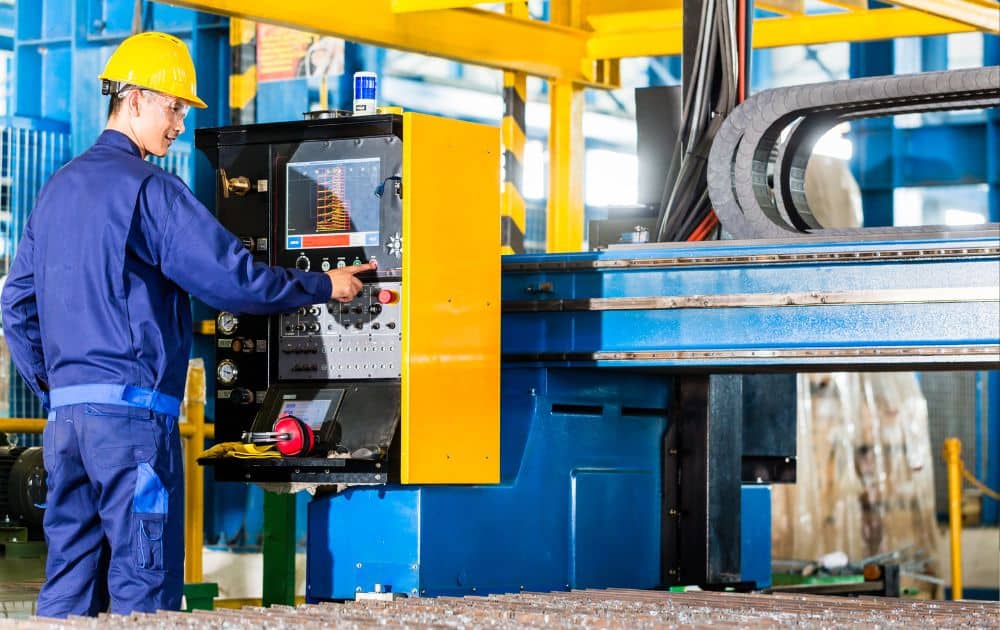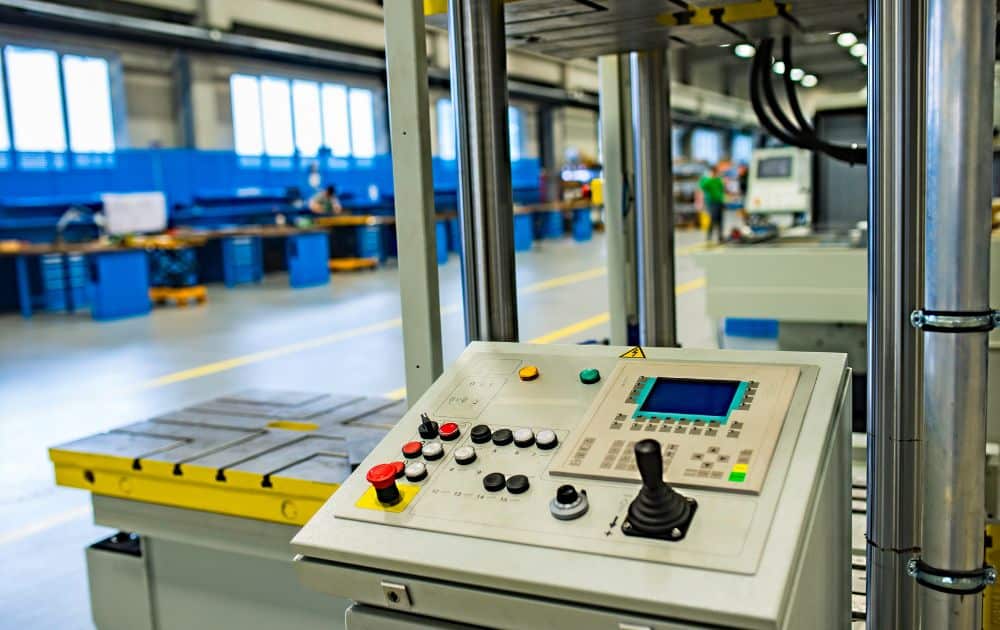The manufacturing industry is increasingly relying on Information Technology (IT) solutions to streamline operations, enhance efficiency, and drive growth. Manufacturing IT solutions encompass a wide range of technologies and software applications tailored to meet the unique needs and challenges faced by businesses in the manufacturing sector.
Partnering with a reliable IT Service Provider ensures that these technological advancements are effectively integrated into daily operations, supporting seamless production and sustainable business growth.

Importance of IT Solutions in Manufacturing
IT solutions enable manufacturing businesses to optimize their processes, improve productivity, and achieve a competitive edge. Here are a few key reasons why IT solutions are essential in the manufacturing industry:
-
Process Automation
IT solutions automate various manufacturing processes, reducing the reliance on manual labor and minimizing the risk of errors. This automation enhances efficiency, speeds up production cycles, and allows businesses to meet customer demands more effectively.
-
Data Management and Analysis
Manufacturing IT solutions facilitate the capture, storage, and analysis of vast amounts of data generated throughout the production cycle. By leveraging advanced analytics and data-driven insights, businesses can make informed decisions, identify areas for improvement, and optimize their operations for better outcomes.
-
Supply Chain Optimization
IT solutions enable seamless integration and coordination across the entire supply chain, from procurement to production to distribution. This integration improves supply chain visibility, enhances inventory management, and enables timely delivery of products, resulting in improved customer satisfaction.
-
Quality Control and Compliance
IT solutions provide tools and systems for quality control and compliance management. By automating quality assurance processes, manufacturers can ensure consistent product quality, adhere to industry standards and regulations, and minimize the risk of defects or recalls.

Overview of the Manufacturing IT Landscape
The manufacturing IT landscape is diverse and encompasses a wide range of solutions tailored to meet specific needs. Some common types of IT solutions utilized in the manufacturing industry include:
- Enterprise Resource Planning (ERP) Systems- Comprehensive systems that integrate various business functions, such as finance, inventory management, and production planning, into a single platform.
- Manufacturing Execution Systems (MES)- Software applications that monitor, control, and optimize manufacturing operations in real-time, providing visibility and traceability throughout the production process.
- Product Lifecycle Management (PLM) Systems- Solutions that manage the entire lifecycle of a product, from concept and design to manufacturing and maintenance, ensuring collaboration and data integrity across teams.
- Supply Chain Management (SCM) Systems- Tools that enable effective management of the end-to-end supply chain, including procurement, logistics, inventory management, and demand forecasting.
- Internet of Things (IoT) Applications- IoT devices and sensors that capture real-time data from manufacturing equipment, enabling predictive maintenance, remote monitoring, and optimization of machine performance.
These are just a few examples of the many IT solutions available in the manufacturing industry. The choice of IT solutions depends on the specific business needs, existing IT infrastructure, and long-term goals of the organization. By leveraging the right IT solutions, manufacturers can unlock the full potential of technology and drive innovation in their operations.
As technology continues to evolve, it is crucial for manufacturers to stay updated with the latest manufacturing IT trends and explore how emerging technologies can further enhance their processes and outcomes. With the right IT solutions in place, manufacturers can navigate the complex challenges of the industry and tap into new opportunities for growth and success.
Identifying Business Needs
Before implementing any IT solutions in the manufacturing industry, it's crucial to identify and understand the specific business needs. This involves assessing the current IT infrastructure and gaining a clear understanding of the manufacturing requirements. Let's explore these two key aspects in detail.
Assessing Current IT Infrastructure
To effectively identify business needs, it is important to assess the existing IT infrastructure within the manufacturing organization. This evaluation helps in understanding the strengths and weaknesses of the current systems and processes. By conducting a thorough assessment, businesses can determine the areas that require improvement and identify potential bottlenecks.
During the assessment, various factors should be considered, such as the hardware and software systems in place, network infrastructure, data security measures, and overall IT performance. Analyzing these aspects allows businesses to gain insights into the efficiency and effectiveness of their current IT infrastructure. This assessment also helps identify areas where IT solutions can be implemented to enhance productivity and streamline operations.
Understanding Specific Manufacturing Requirements
Manufacturing processes can vary significantly across industries, and each organization may have unique needs and challenges. Understanding these requirements allows businesses to tailor IT solutions to address their specific manufacturing needs.
Key manufacturing requirements to consider include production planning and scheduling, inventory management, quality control, supply chain management, and compliance with industry regulations. Taking care of all these enable businesses to develop IT solutions that align with their manufacturing processes and support their overall goals and objectives.
To gain a comprehensive understanding of the specific manufacturing requirements, it is beneficial to collaborate with stakeholders from different departments, including production, operations, logistics, and quality control. This collaboration ensures that all perspectives are considered and that the IT solutions developed meet the needs of the entire organization.
Conducting a thorough assessment of the current IT infrastructure and understanding specific manufacturing requirements allows businesses to lay a strong foundation for developing and implementing effective IT solutions.
Developing Custom IT Solutions
Let’s explore the pros and cons of customization versus off-the-shelf solutions and highlight the importance of collaborating with IT solution providers.
Customization vs. Off-the-Shelf Solutions
Customization refers to the process of tailoring IT solutions to meet the specific needs and requirements of a manufacturing business. This approach allows businesses to have full control over the features, functionality, and integration of the IT solution. This way, businesses can align it with their unique processes and workflows, resulting in a more efficient and effective system.
On the other hand, off-the-shelf solutions are pre-built software or hardware solutions that are readily available in the market. These solutions are designed to address common needs of the manufacturing industry and are often cost-effective and easy to implement. They offer a quicker turnaround time and require minimal customization efforts.
When deciding between customization and off-the-shelf solutions, businesses need to consider several factors. Customization offers the advantage of tailored solutions that can perfectly fit the specific requirements of the manufacturing processes. However, it may require a higher investment of time, resources, and expertise. Off-the-shelf solutions, while providing a quicker implementation, may not fully align with the unique needs of a business.
Collaborating with IT Solution Providers
Collaborating with IT solution providers like LK Tech can be crucial in developing custom IT solutions. When selecting an IT solution provider, businesses should consider their track record, industry experience, and the ability to deliver solutions within the desired timeframe and budget. Collaborating closely with the provider is essential to ensure that the solution meets the business's specific needs.
During the collaborative process, businesses should clearly communicate their requirements, goals, and expected outcomes. Regular communication and feedback loops help in refining the solution and addressing any challenges that arise along the way. By working hand in hand with IT solution providers, businesses can develop custom IT solutions that enhance operational efficiency, streamline processes, and improve overall performance.

Implementing IT Solutions
Implementing IT solutions in the manufacturing industry requires careful planning and seamless integration with existing systems. This section focuses on the crucial steps of planning and preparation, as well as the integration of IT solutions with the current manufacturing infrastructure.
Planning and Preparation
Before implementing any IT solution, thorough planning and preparation are essential to ensure a smooth transition. This involves assessing the specific needs of the manufacturing facility, setting clear objectives, and establishing a timeline for implementation.
To begin, it is crucial to identify the key pain points and challenges within the manufacturing processes that the IT solution aims to address. This could involve streamlining operations, improving efficiency, reducing costs, or enhancing product quality. Clearly defining desired outcomes enables businesses to effectively evaluate and select the most suitable IT solutions.
In the planning phase, it’s also important to involve stakeholders from various departments within the organization, including IT, operations, and management. Collaborative discussions and brainstorming sessions can help identify potential obstacles and ensure that the selected IT solution aligns with the overall business strategy.
Integration with Existing Systems
Integrating the new IT solution with the existing manufacturing systems is a critical step in the implementation process. This involves seamless connectivity and data exchange between different components of the IT infrastructure.
The integration process begins with a thorough assessment of the current systems to identify any potential compatibility issues. It is important to ensure that the IT solution can effectively communicate with existing hardware, software, and databases. This includes enterprise resource planning (ERP) systems, manufacturing execution systems (MES), and other critical systems used in the manufacturing environment.
Data migration is another aspect of integration that requires careful attention. The IT solution should be able to efficiently transfer and synchronize data between different systems to maintain accurate and up-to-date information.
By adequately planning and integrating IT solutions, businesses can optimize their manufacturing processes and leverage the power of technology to drive efficiency and productivity.
Monitoring and Evaluation
Once manufacturing IT solutions are implemented, it’s important to continuously monitor and evaluate their performance. This allows businesses to track the effectiveness of the solutions and make necessary adjustments to optimize their operations. In this section, we will explore the key aspects of monitoring and evaluation in manufacturing IT solutions, including tracking performance metrics and addressing challenges through iterative improvements.
Tracking Performance Metrics
To gauge the success of IT solutions in manufacturing, it’s essential to establish and track relevant performance metrics. These metrics provide valuable insights into various aspects of the manufacturing process and help identify areas for improvement. Here are some common performance metrics to consider:
- Downtime- Measure the amount of time production is halted due to IT-related issues.
- Cycle Time- Determine the time it takes to complete a process or operation within the manufacturing workflow.
- Quality Control- Assess the level of product quality by monitoring defect rates, rework, or scrap.
- Inventory Management- Track inventory accuracy, turnover rate, and stockouts to optimize supply chain efficiency.
- Cost Efficiency- Evaluate the cost-effectiveness of IT solutions by monitoring operating costs and resource utilization.
- Customer Satisfaction- Measure customer feedback, response time, and order fulfillment to ensure customer expectations are met.
Regularly analyzing these performance metrics allows businesses to identify bottlenecks, inefficiencies, and areas needing improvement. This data-driven approach enables informed decision-making and facilitates the continuous optimization of manufacturing processes.

Addressing Challenges and Iterating Solutions
In the dynamic landscape of manufacturing, challenges are bound to arise despite the implementation of IT solutions. It is essential to address these challenges promptly and iteratively refine the solutions to ensure their effectiveness. Here are some common challenges and best practices for addressing them:
- Technical Issues: Promptly respond to technical issues such as system failures, network connectivity problems, or software glitches. Collaborate with IT solution providers to troubleshoot and resolve these issues efficiently.
- User Adoption: Ensure that employees across all levels of the organization are trained adequately to use the IT solutions effectively. Provide ongoing support and resources to encourage user adoption and address any resistance or confusion.
- Data Security: Implement robust cybersecurity measures to protect sensitive manufacturing data from unauthorized access, breaches, and malware attacks. Regularly update security protocols and educate employees about best practices for data protection.
- Scalability: As manufacturing operations grow, IT solutions should be scalable to accommodate increased demands. Regularly assess scalability requirements and collaborate with IT solution providers to ensure the solutions can adapt to evolving needs.
- Continuous Improvement: Encourage a culture of continuous improvement by soliciting feedback from employees and stakeholders. Use this feedback to identify areas of improvement and iterate the IT solutions accordingly.
Monitoring and evaluating manufacturing IT solutions is an ongoing process that enables businesses to stay ahead in a competitive environment. By tracking performance metrics and addressing challenges through iterative improvements, organizations can maximize the benefits of their IT solutions and achieve operational excellence.
Upgrading IT Solutions
As technology advances and new features become available, upgrading IT solutions is essential to optimize performance and enhance efficiency in manufacturing processes. Upgrades can involve various aspects of IT solutions, including hardware, software, and infrastructure.
When considering an upgrade, it's important to evaluate the specific needs and requirements of the manufacturing business. This assessment should take into account factors such as scalability, security, and compatibility with existing systems. By upgrading IT solutions, manufacturers can take advantage of new functionalities, improved performance, and enhanced security measures.
To determine the most suitable upgrade path, collaboration with IT solution providers is vital. These experts can provide valuable insights, recommend relevant upgrades, and assist in the implementation process. Through close collaboration, manufacturers can ensure that the upgraded IT solutions align with their business goals and contribute to increased productivity and profitability.
Enhance Your Manufacturing Efficiency with LK Tech in Cincinnati!
Allow us to help you revolutionize your manufacturing operations with cutting-edge IT solutions. From customized strategies to robust infrastructure support, LK Tech specializes in optimizing efficiency and productivity for manufacturing businesses. Whether you're looking to streamline processes, enhance security measures, or leverage new technologies, our expert IT services in Cincinnati, Ohio can propel your business towards greater success!


